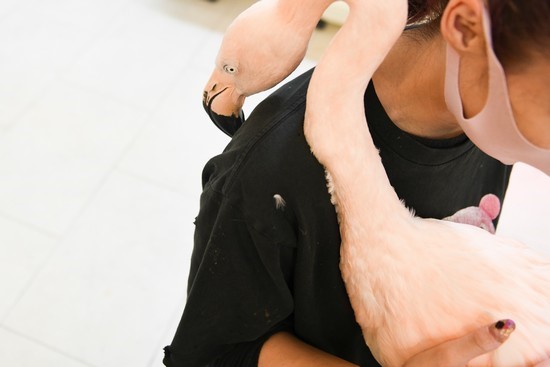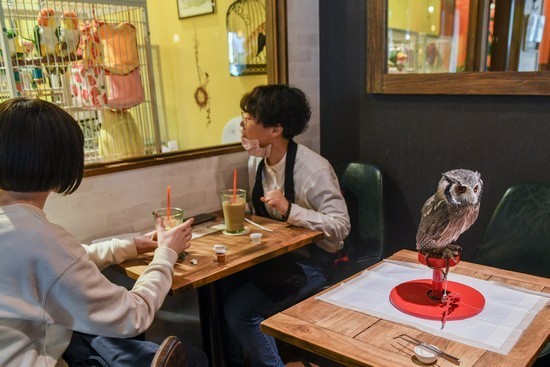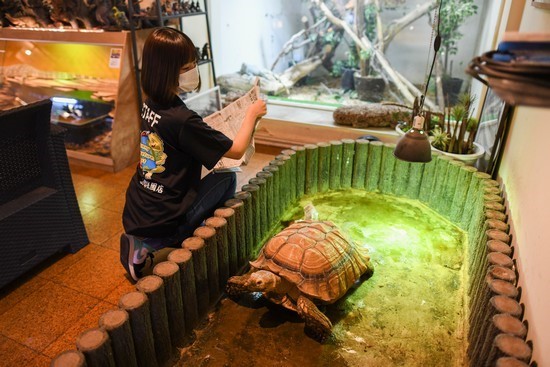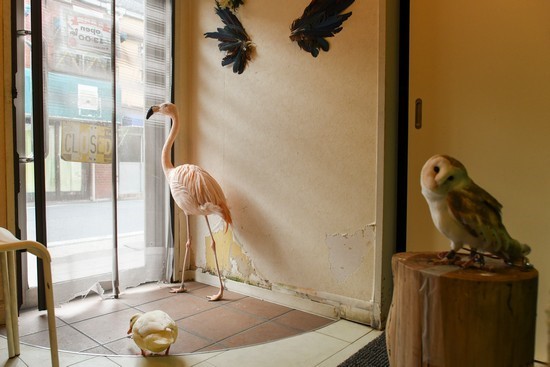In Japan, it is possible to enjoy
a coffee while an owl perches on your head, or to sit at a bar where penguins
stare out at you from behind a Plexiglas wall. The country’s exotic animal
cafes are popular with locals as well as visitors seeking novelty, cuteness,
and selfies. Customers can even buy animals at some cafes and bring them home.
اضافة اعلان
But visitors of these venues may not
realize that many of these cafes put wildlife conservation, their own and
public health, and animal welfare at risk.
In an exhaustive survey of Japan’s animal
cafes published this year in the journal Conservation Science and Practice,
researchers found 3,793 individual animals belonging to 419 different species,
52 of which are threatened with extinction. Nine of the exotic species they
found, including endangered slow lorises and critically endangered radiated
tortoises, are strictly banned from international trade.
 An employee holds a flamingo inside an animal cafe in
Nagoya, Japan.
An employee holds a flamingo inside an animal cafe in
Nagoya, Japan.
“Some species we saw are of very
questionable origins,” said Marie Sigaud, now a veterinarian and wildlife
biologist at the National Museum of Natural History in Paris, who conducted the
study as a postdoctoral researcher at Kyoto University. Many of the animals are
“most likely caught in the wild, and this has implications for their long-term
survival”.
Disease danger?The potential for transmission of disease
from animals to humans is also worrying, Sigaud said.
At a typical cafe, individual animals of
different species are crammed together in a small room where people are allowed
to touch them while having a drink, said Cécile Sarabian, a cognitive ecologist
at Nagoya University and co-author of the findings. Many of the animals are
under stress and “it’s an excellent interface for the exchange of potential
pathogens”, she said.
Many of the animals are under stress and “it’s an excellent interface for the exchange of potential pathogens”
The laws governing animal cafes are “quite
weak”, Sarabian added — and the researchers are calling on Japan’s government
to strengthen them.
Officials at Japan’s Ministry of the Environment
did not respond to requests for comment.
Owls, cockatoos, and pythonsExotic animal cafes are not uniquely
Japanese. Since the first known animal cafe opened in Taiwan in 1998, featuring
cats and dogs, the concept has rapidly spread across the region. A 2020 study
identified 111 such businesses in Asia, primarily in Japan but also in China,
Thailand, Taiwan, Indonesia, South Korea, Vietnam, the Philippines, and
Cambodia. Japan, however, seems to have become “the epicenter of the
phenomenon”, Sigaud said.
The researchers visited some cafes in Japan
in person and also searched online and across social media in both English and
Japanese for keywords such as “pet cafe”, “otter cafe”, and “petting zoo.” They
found 142 exotic animal cafes across the Japanese archipelago and made a list
of all the species they observed in photos posted on the cafes’ websites and
social media accounts, excluding insects.
 An owl brought
to the table for customers so that they can touch it at an animal cafe in
Tokyo.
An owl brought
to the table for customers so that they can touch it at an animal cafe in
Tokyo.
The number and diversity of animals came as
a surprise, Sigaud said. Birds accounted for 62 percent of species, and 40
percent of them were owls. But the researchers also recorded dozens of reptiles
and mammals.
Thirty-eight of the cafes also offered
options for buying the animals they displayed — owls, primarily, but also
species as diverse as sugar gliders for $150 to $300; ball pythons for $455 to
$1,290; secretary birds for $20,500; and red-tailed black cockatoos for
$23,250.
A 2020 study identified 111 such businesses in Asia... Japan, however, seems to have become “the epicenter of the phenomenon”.
Some of the species were of particular
concern, including critically endangered ones such as the pancake tortoise and
the Central American river turtle. Others were of questionable origin. Bengal
slow lorises and Sunda slow lorises, for example, are endangered species from
South and Southeast Asia that are frequently the victims of poaching and are
strictly banned from international trade. They are difficult to breed in
captivity, Sigaud said, and no professional facilities for these species exist
in Japan.
 A staff member cleans the space of an African spurred
tortoise at Funny Creature Forest in Kyoto, Japan.
A staff member cleans the space of an African spurred
tortoise at Funny Creature Forest in Kyoto, Japan.
“So where are they coming from?” Sigaud
said. “It’s hard to believe they’re legal.”
Animal welfare concernsSarabian and her colleagues also flagged
welfare concerns at cafes. Animals can become stressed through constant
handling, birds of prey are chained to perches and nocturnal species are made
to interact with visitors throughout the day, she said. Nearly all species are
kept in small cages and artificial environments and are looked after by people
with no specific training or qualifications to work with wildlife.
Kimura, who has loved coldblooded creatures since he was a child, said he opened his cafe to share “the charm of reptiles” with others. “A big lizard can make you feel like you’re raising a dinosaur.”
Kohei Kimura, the owner of Funny Creatures
Forest, an animal cafe in Kyoto that specializes in reptiles, said he often
heard criticisms like the ones raised by the new study, including that cafes
keep protected species and that the animals there are mistreated. Kimura —
whose cafe exhibits around 40 types of reptiles, plus three owls and some
tropical fish — said he took extra care to ensure he was not contributing to
these problems. He sources all of his animals from wholesalers in Japan or
breeds them himself. He forbids customers from touching the owls while they are
sleeping, he said, and has built his own specialized cages for the reptiles
because “the commercially available cages are too small”.
 A flamingo, a duck and an owl at an animal cafe in
Nagoya, Japan.
A flamingo, a duck and an owl at an animal cafe in
Nagoya, Japan.
Kimura, who has loved coldblooded creatures
since he was a child, said he opened his cafe to share “the charm of reptiles”
with others. “A big lizard can make you feel like you’re raising a dinosaur.”
“In Japan, reptiles are often disliked and
thought to be scary, but in reality, many of them are gentle,” he added.
Read more Odd and Bizarre
Jordan News



